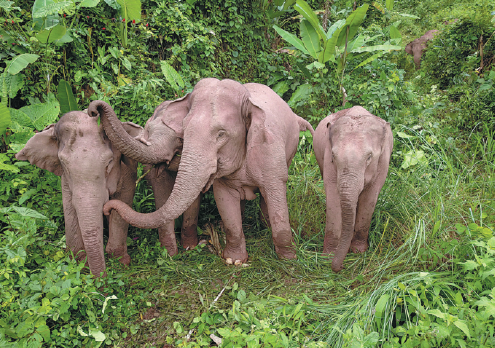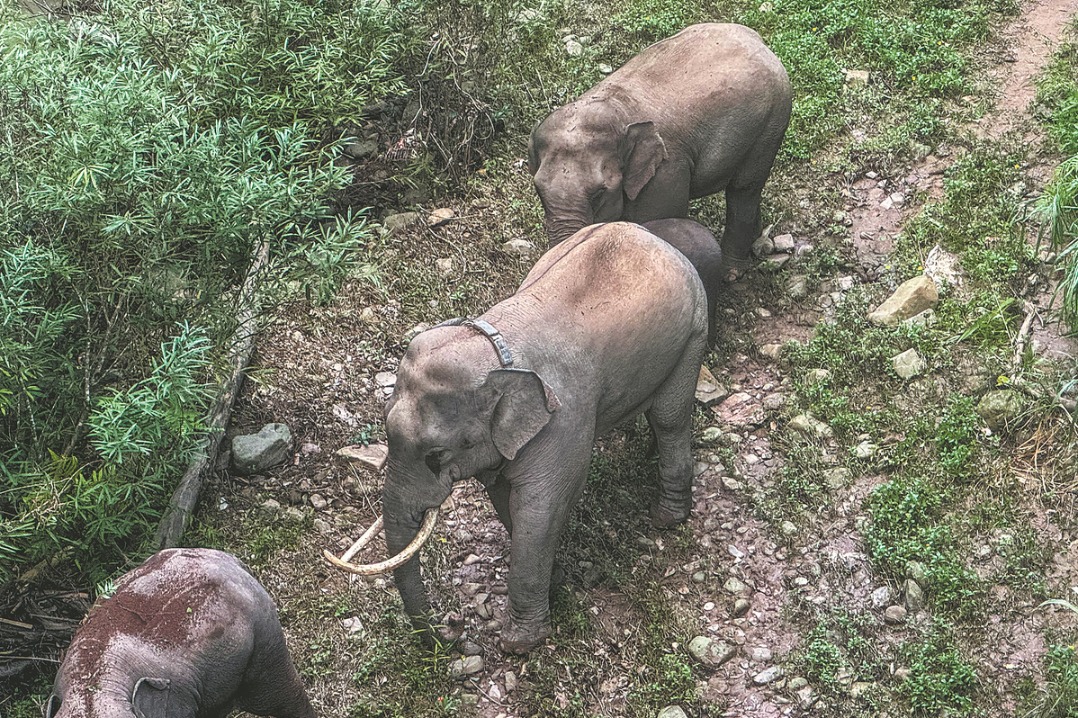Food base to solve a jumbo-size problem


Jinghong, in Southwest China's Yunnan province, will soon open a food source base especially developed for Asian elephants, in a bid to reduce conflicts between humans and the animal.
The project, with investment of 1 million yuan ($154,686), kicked off in December and was completed in May. The base, which covers three townships across 67 hectares, has grown some of the elephants' favorite plants, including 38,000 musa basjoo trees, a species of banana.
Construction workers also built several ponds and added 2 metric tons of salt to meet the elephants' mineral needs.
In late August, experts conducted a preliminary field inspection. The city's forestry and grassland bureau has not revealed the opening date of the base but said it will start operating soon.
"The project is meant to improve the quality of Asian elephants' habitat, enrich their food sources and provide them with more to eat," said Cha Wei, an official from the bureau. "After the completion of the project, elephants will be able to eat in the food source base. This can stop them from foraging in villages and damaging farmers' crops."
The Asian elephant has been listed as an endangered species on the Red List of International Union for Conservation of Nature. The animal is under first-class State protection in China and can be found in the area of Yunnan that borders Myanmar and Laos.
Due to ongoing wildlife protection efforts, the number of wild Asian elephants in the province has increased from 170 in 1980 to 300 today. Jinghong is home to about 185 elephants, and their habitat spans about 350,000 hectares.
"The number increase is closely linked to the growing awareness of our people to protect wildlife. The elephants' trek earlier this year is also due to the increasing number of herds," Cha said, referring to a herd of 15 elephants that left their habitat in Xishuangbanna and started migrating north in March last year, with their journey attracting global attention.
Cha said elephants are very intelligent and understanding of each other. When their population reaches a certain density, a herd will divide to reduce crowding and avoid interbreeding.
An adult elephant needs 200 kilograms of food every day. With increased protection of nature reserves and reduction of human activities in the reserves, many elephant habitats have grown into dense forests and replaced low shrubs and plants that elephants feed on. Clusters of tall trees also restrict the animals' movements, forcing them to leave forests and enter farming areas and communities.
Reports of elephants eating corn and sugar cane crops during harvest season are not uncommon. "As elephants enter agricultural lands more frequently, their eating habits have also gradually changed, showing a growing preference for fine grains, high-energy and more nutritious cash crops," Cha said, adding that the animals have also become very "picky", often selecting the most nutritious corn cobs.
Cha said Asian elephants usually forage at night and rest in woods during the day.
"We selected the areas where Asian elephants showed the most frequent activity, and we transformed and upgraded those areas. We also want to improve the current diet of the elephants, guide them to return to the protected areas and reduce human-elephant conflicts," he said.
"This is a pilot project. Later, we hope to share and promote our experiences with other counties and cities to protect the Asian elephants together. Building a harmonious coexistence between humans and elephants is our ultimate goal," he added.
- Nation ramps up public services to meet rising cultural demand
- World Bank report ranks Hong Kong among top 10 global business hubs
- National Day holiday brings box office surge
- Hong Kong wins global acclaim as one of top places to do business
- Travel boom continues as Chinese enjoy National Day holiday
- Xi Focus: Leading the way to Chinese modernization through sci-tech innovation





































